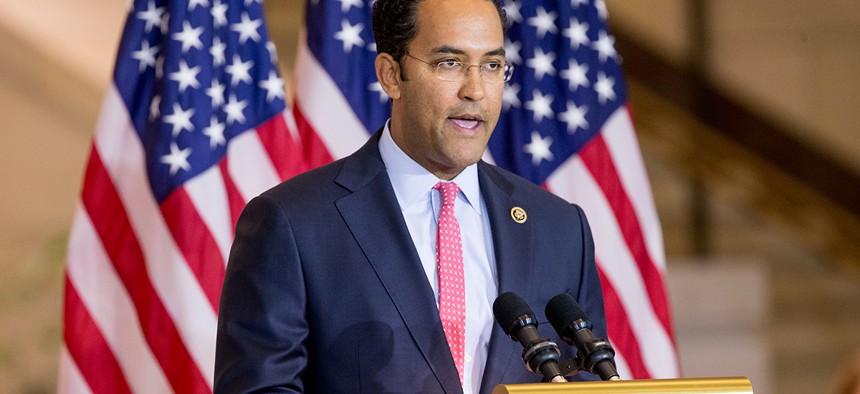Hurd Introduces Modernizing Government Technology Act to House

Rep. Will Hurd, R-Texas Andrew Harnik/AP
New IT legislation is a combination of Hurd’s MOVE IT act and the IT Modernization Fund championed by U.S. CIO Tony Scott
Rep. Will Hurd, R-Texas, on Thursday introduced new IT legislation to the House designed to help move government into the 21st century.
The Modernizing Government Technology Act of 2016 is a combination of the MOVE IT Act he introduced earlier this summer and the IT Modernization Fund introduced by Rep. Steny Hoyer, D-Md., in the spring that has been championed heavily by U.S. Chief Information Officer Tony Scott.
The legislation, co-sponsored by Rep. Gerry Connolly, D-Va., would create an IT Modernization Fund administered by the General Services Administration to agencies looking to borrow money to modernize IT systems in accordance with recommendations from an IT Modernization Board, which the legislation would also create. Hoyer’s bill stipulated the modernization fund would be $3.1 billion, but MGT does not tie the legislation to a specific dollar value.
The eight-person board would consist of an administrator (the federal CIO) and senior officials from GSA as well as the National Institute of Standards and Technology, departments of Homeland Security and Defense as well as three additional IT experts from government appointed by the administrator. All would serve one-year terms renewable up to three times.
The board would review all proposals before funds could be allotted through the ITMF, which would then have to be repaid, and would seek out attractive modernization efforts across government.
In the absence of “compelling circumstances,” funds would be doled out to agencies “only on an incremental basis, tied to metric-based development milestones achieved by the agency,” encouraging agile development practices. Transparency is also highlighted, with the legislation calling for a public dashboard of modernization efforts afoot to be updated quarterly.
MGT would also create individual working IT capital funds in CFO Act agencies, a stipulation first introduced in Hurd’s MOVE IT act.
The funds would be sourced through the reprogramming or transfer of existing funds currently used for operation and maintenance of legacy systems. Currently, the federal government spends nearly three-quarters of the $90 billion IT budget on maintaining legacy systems, and such funds are geared toward being used for transition to cloud computing, enhanced cybersecurity and other modern technologies. The bill mandates the funds only be used to retire or replace existing outdated systems; to transition to new IT systems or to address “evolving threats to information security.”
Early indications are that MGT enjoys bipartisan support, favorability among appropriators and backing from industry groups.
Rep. Elijah Cummings, D-Md., ranking member of the House Oversight and Government Reform Committee, called MGT a “very good bill” Thursday and said the legislation “would provide a mechanism for agencies to speed up the process of moving from legacy IT systems to cutting-edge cyber technologies.” Oversight committee Chairman Jason Chaffetz, R-Utah—who did not support Hoyer’s ITMF—called MGT a “good piece of bipartisan legislation” delivered by an “impressive group of people.”
Two leading industry groups, the IT Alliance for the Public Sector and the Professional Services Council, also praised the legislation.
“Last year, the federal government spent $80 billion on IT systems, 80 percent of which was spent maintaining outdated, legacy systems,” Hurd said in a statement. “We don’t have to be stuck in the Stone Age. A move to growing technologies like the cloud can help keep our information secure, while saving billions of dollars. It’s time to stop wasting tax dollars and move government into the 21st century.”



